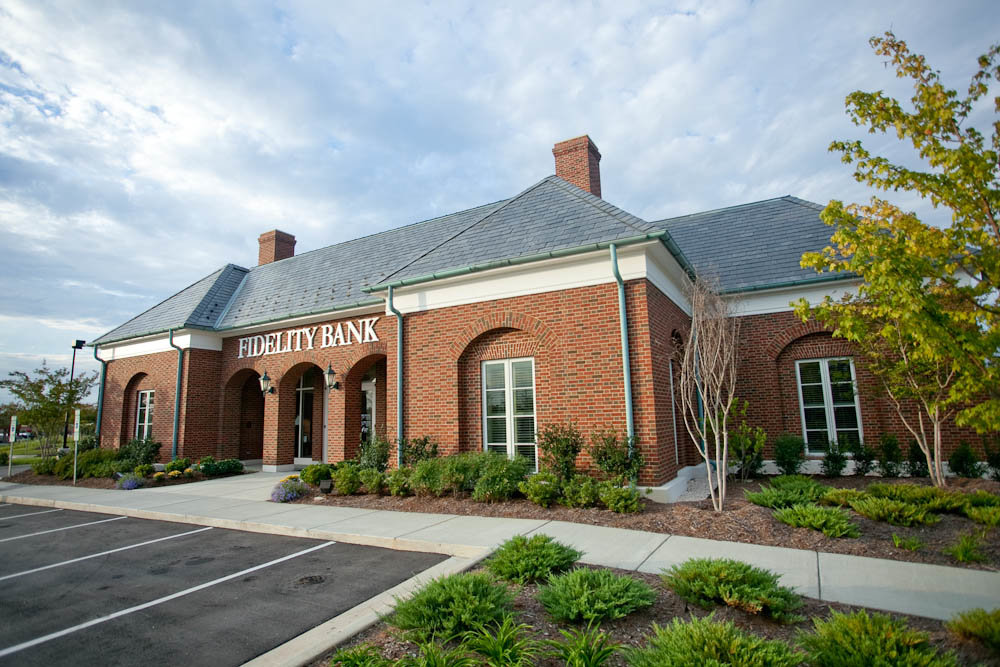
It’s been a tough year for most businesses. But some, such as Fuquay-Varina-based Fidelity Bank, have thrived — so much so that it’s planning to open a new location in Pittsboro.
Fidelity Bank (not to be confused with Fidelity Investments Inc., the multi-trillion dollar asset-holding financial services company headquartered in Boston) recently filed a new branch application with the North Carolina Commissioner of Banks, requesting authority to open a site at Industrial Drive, as first reported by the Triangle Business Journal last week.
Fidelity Bank representatives, including CEO Mary Willis, did not respond to News + Record requests for comment, but the bank’s behavior suggests what you already know: Pittsboro is a hotbed for new businesses hoping to cash in on the town’s expected growth.
It’s the perfect spot for a small but ambitious institution like Fidelity. The bank is hungry for further expansion having capitalized on unique pandemic opportunities to elevate its stature in a crowd of national giants such as JP Morgan and Wells Fargo.
When the Paycheck Protection Program was announced last year, Fidelity Bank had about $2 billion in assets. But the bank rallied to attract new customers through PPP, and issued a bigger share of the government funded loans than its footprint should have allowed. The result: 30% asset growth within a few months and a host of new customers to propel future expansion.
Now, the company holds $2.9 billion and operates 57 locations across North Carolina and Virginia, according to the TBJ.
But the move is something of a gamble.
Some experts anticipate the worst of our pandemic-impelled economic fallout may yet lie ahead, and banks especially could face crippling losses in coming months.
The banking industry as a whole stands on precarious ground. Every metric should indicate a grim market. Interest rates are historically low, which hurts bank profit. Millions nationwide are out of work and strapped for cash, so credit card spending has dawdled. Many are living off savings, leaving banks with fewer assets to invest.
That’s why lugubrious finance gurus say a precipitous crash is coming — something à la 2008’s housing bubble crisis.
“You may think that such a crisis is unlikely, with memories of the 2008 crash still so fresh. But banks learned few lessons from that calamity, and new laws intended to keep them from taking on too much risk have failed to do so,” Frank Partnoy, a law professor and finance expert at UC Berkeley, wrote in The Atlantic last summer.
“As a result, we could be on the precipice of another crash, one different from 2008 less in kind than in degree,” he added. “This one could be worse.”
Since then, the economy has stayed about level. But seeming stability does not preclude the oncoming trough, Partnoy warned.
“The present is analogous not to the fall of 2008, when the U.S. was in full-blown crisis,” he said, “but to the summer of 2007, when some securities were going underwater but no one yet knew what the upshot would be.”
Anticipating such potential disaster, major banks around the country began stockpiling reserves at the pandemic’s start. But most are loosening their spending habits as conditions appear to recover. Last year’s economic decline was not the result of legitimate systemic shortcomings, they say, but of an irregular and temporary tempest which is finally abating.
I agree with the banks. Sure, there’s still the chance that a wave of indebted consumers default on their bank loans when government stimulus money dries up and forbearance programs expire. But a national fervor for the resumption of regular life suggests a boom in spending that will offset bank losses.
Already, banks are reporting upticks in profitability. JP Morgan has seen mortgages and auto loans rise 20% from a year ago, according to the New York Times. Profits from stock trading went up 32% and earnings from bonds, currencies, commodities and other products have risen by 15%.
Wells Fargo, Citigroup and other major players have published similar reports.
Should Partnoy’s forecast come to bear, a small institution in high-earning markets such as Fidelity Bank should be insulated from much of the catastrophe. The move to Pittsboro is a good one — for the bank and future borrowers.
Have an idea for what Chatham business topics I should write about? Send me a note at dldolder@chathamnr.com or on Twitter @dldolder.